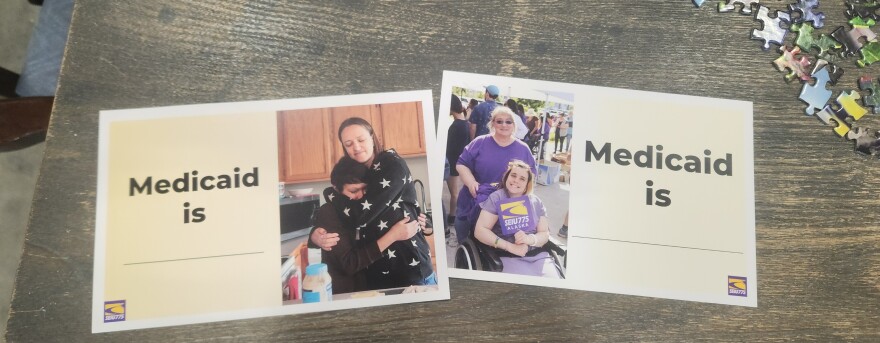At Red Bird Kitchen in Homer, caregivers and other community supporters wrote postcards to state legislators backing House Bill 96.
The event was organized by the Alaska Caregivers Union, which operates under the Service Employees International Union 775 that represents more than 55 thousand long-term care workers in Alaska, Washington, and Montana, including many in-home caregivers across Alaska.
Sonshine Konovalov is one of the bargaining team members with the labor union. She’s worked as an in-home caregiver for more than a decade and said the work is demanding — both physically and financially.
“We are not making living wages. We can barely pay our bills, and our benefits need to change,” Konovalov said.
House Bill 96 would create the Home Care Employment Standards Advisory Board. The group would review wages, training, staffing shortages and other issues affecting in-home care workers, and make recommendations to the state’s health commissioner.
Representative Mike Prax, a Republican from North Pole, is sponsoring the bill. He said the board is a new federal requirement.
“It's something that we are going to have to do, the state will have to do because the Centers for [Medicare and] Medicaid Services are coming down with a requirement for these advisory boards,” Rep. Prax said.
The bill would also require agencies that provide personal care services through Medicaid to spend at least 70 percent of that funding on employee wages and benefits starting in 2026. That number would increase to 80 percent by 2030, with exceptions for small or struggling providers.
Medicaid is the federal insurance program for Americans with lower incomes and disabilities.
Rep. Prax said Alaska’s aging population is increasing the need for in-home care, but there aren’t enough workers to meet the demand. He says the bill—which, in part, requires agencies to spend more on wages and benefits—could help attract more people to the profession.
Medicaid funding itself is at risk. Budget writers in Congress plan to make massive cuts to unspecified programs that may include Medicaid.
Caregiver Amy Backas helped organize the postcard event in Homer. She said many of her clients rely on Medicaid to receive services that help them stay in their homes.
“If Medicaid gets cut, a lot of these people are going to have to possibly go into institutions. Their quality of care is going to be dramatically reduced. If they don't have enough hours of Medicaid care, then they won't be able to be safe in their home,” Backas said.
Backas and other caregivers have also traveled to Juneau to meet with lawmakers. Jen Williams, an early organizer with the Alaska Caregivers Union, said the bill would help ensure agencies are transparent about how they spend Medicaid dollars.
Williams said the issue isn’t just about caregivers — it also affects families, elders, and people with disabilities who rely on Medicaid for basic care.
“They've been paying into Medicaid their whole life. For them to have to struggle to have it or have access to it is just wrong. In my book, it's cruel to you to have people go without the care they deserve,” Williams said.
Rep. Prax said the bill has been met with broad support in the legislature, including bipartisan co-sponsorship.





